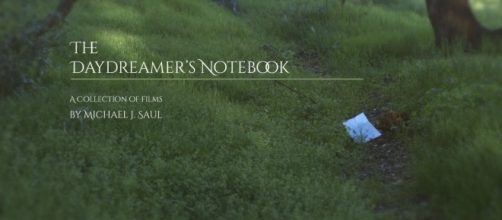Michael Saul is a filmmaker who has been creating movies for over four decades. In August of 2017, Saul released a collection of short experimental films titled "The Day Dreamer's Notebook" containing both old and new works.
The topics of the films in the collection range from childhood nightmares ("Nightcrawler") to long-lost friendships ("Cons, Idol and Boat 14") to music videos and other collaborations ("Euphoria" and "Subterrania"). The ensemble also features the debut of Michael's "The Cipher and the Boar" which was filmed in 1981 and tells the story of two orphans who face a terrifying taxidermist.
Michael Saul recently discussed his short films and more via an exclusive interview.
Movies, genres, and the creative process
Meagan Meehan (MM): What initially inspired you to create films and do you favor any particular genres?
Michael Saul (MS): When I was a teenager my father encouraged me to shoot family home movies, and I fell in love with the process of making films and photography. That, coupled with inspiration by some of the great movies of the 1970s, really pushed me forward in my pursuits. I’m not sure I have a favorite genre as much as a favorite style. I like unconventional storytelling techniques, visual as opposed to verbal. I hate the conventional three-act formula that Hollywood is so in love with.
I much prefer films that pose more questions than answers and allow the viewer to help create the movie - an emphasis on character rather than the story.
MM: What most interests you about short films and did you write all the ones featured in the new collection yourself?
MS: Short form filmmaking has always been a passion. Personally, I have far too many stories and ideas I want to put forward, then I will ever have the money and time to make. A feature film takes upwards of five years to create. I’d much rather get those ideas and concepts out in shorter form and shorter production time, if possible. Regarding writing: I do write, and I wrote the scripts for all my features, but given the nature of these shorts, they were (except for “The Cipher and the Boar”), created in a nonlinear, visual manner rather than being scripted.
MM: What was the process of filming these movies like and how did time and technology impact their creation?
MS: Being that the shorts were created over a forty-year period, the process was different for each. The older films (like “The Cipher and the Boar, Boat 14” and “Idol”) were shot on 16mm film. The newer titles are obviously digital. They were all created with volunteer cast and crews, so shooting was mostly on the weekends taking place over many months. I also funded the early films with part-time jobs, so they depended on my available finances at the time. “The Cipher and the Boar is one project I would love to remake using current technologies. Digital would allow us to make the film as I originally pictured it.
That’s something I’d love to do some day.
MM: How do you typically go about finding the actors and getting the crew and filming locations?
MS: The actors for these early films were mostly kids in my neighborhood in Ohio. I would hold occasional casting sessions at the local library, but most everyone was local or just kids who wanted to be involved. The subject in “Cons” is an ex-boyfriend; “Nightcrawler” and “Euphoria” were cast the traditional ways in L.A. through auditions. I usually shoot my films if possible. I love composing a shot and running the camera, but I have worked with very large crews on some projects over the years. The older films were crewed by friends and brothers and sisters of the cast in some cases.
I rarely had any professionals involved until I came to California.
Favorites, short films, and the future
MM: Be honest, out of all the short films do you have a favorite and, if so, which one and why?
MS: All of these films are very nostalgic for me personally, so it is very difficult to pick a favorite. “The Cipher and the Boar” was the most difficult film to make, and I have an appreciation for its style. I really love “Euphoria” and “Nightcrawler” because they’re newer and allowed me the opportunity to finally tell these stories after rumbling around in my brain for so long.
MM: What are the challenges of working in the movie industry and where do you hope you will be in your career in a decade?
MS: In a decade, I hope I’m still alive! I think all indie filmmakers have the same challenges: attracting money to the project and making your money back from a project. None of us are getting rich, especially with piracy being so insidious. For those of us who reach deep into our own pockets and make films for under thirty thousand dollars, piracy hits us hard. I’d love to find an answer to it. Though, I just want to leave a legacy of intimate stories about life. They’re not going to blow anyone out of the water, but I hope they inspire other artists and give audiences something else to consider.
MM: What projects are you presently working on and is there anything else that you want to discuss or mention?
MS: I have another single-story feature script called “Beauty” that I’d really love to make someday. I have a stack of scripts that I’ve written over the years that I hope see the light of day in the future, and I’ll continue making short films.


